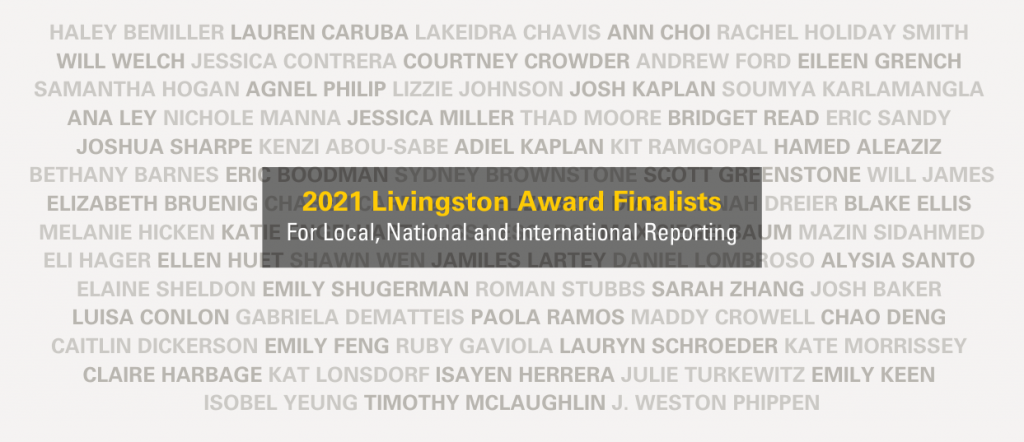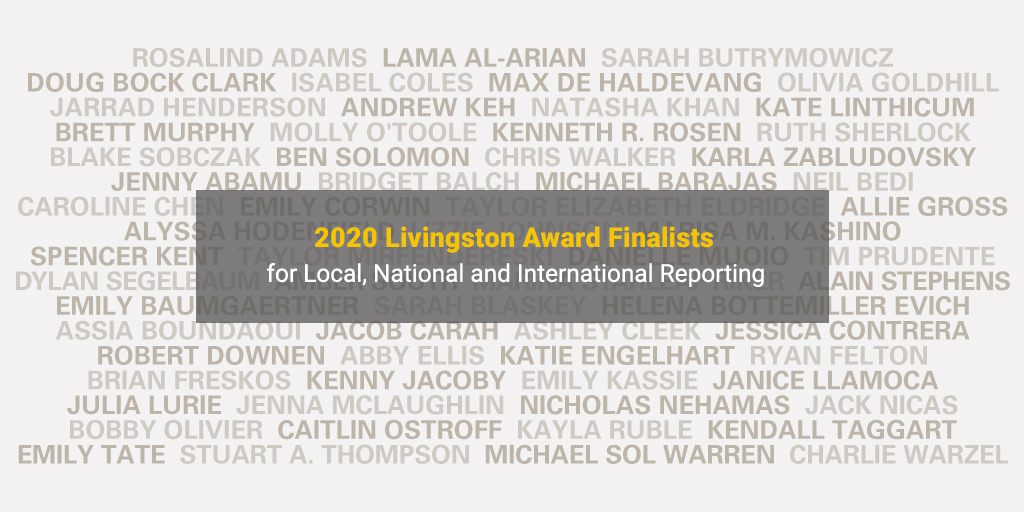
Today the Livingston Awards honor stories that represent the best in local, national and international reporting by journalists under the age of 35. The winning stories include a local news investigation exposing the systematic failures of Maine’s illusive probate courts, a documentary podcast probing timely gender-specific health challenges, and a visually-driven investigation retracing the tragic voyages of West African migrants lost in the Atlantic Ocean on their quest to reach Europe. The $10,000 prizes are for work released in 2023.
The Livingston Awards also honored Kevin Merida, former executive editor of the Los Angeles Times, with the Richard M. Clurman Award for mentoring. The prize is given each year to an experienced journalist who has played a pivotal role in guiding and nurturing the careers of young reporters. The award is named for the late Richard M. Clurman, former chief of correspondents for Time-Life News Service and architect of the Livingston Awards.
Livingston Awards national judges Kara Swisher of New York Magazine, Lydia Polgreen of The New York Times, Raney Aronson-Rath of Frontline and Lynette Clemetson, director of Wallace House, introduced the winners at a ceremony hosted by Livingston Awards emeritus judge Ken Auletta.
“We are honored to recognize this exceptional reporting that uses text, audio and visual storytelling to full effect,” said Lynette Clemetson. “It is especially inspiring to honor the doggedness of these journalists during a period of painful retrenchment in many news organizations. The persistence of young reporters to pursue challenging work with such ambition and creativity pushes our entire industry forward.”
Celebrating its 43rd year, the awards bolster the work of young reporters, cultivate the next generation of journalism leaders and mentors and advance civic engagement around powerful storytelling. Major sponsors include the University of Michigan, Knight Foundation, the Indian Trail Charitable Foundation, the Mollie Parnis Livingston Foundation, Christiane Amanpour, the Judy and Fred Wilpon Family Foundation, Dr. Gil Omenn and Martha Darling and The Joyce Foundation.
The 2024 winners for work released in 2023 are listed below.
Local Reporting
Samantha Hogan, 30, of The Maine Monitor for “Maine’s Part-Time Court,” a year-long investigation into the state’s illusive probate courts. Her reporting exposed stories of individuals whose life savings may have been pocketed by their conservators and revealed eight unexplained deaths of people who were under Maine’s state guardianship.
“Samantha Hogan’s multi-year investigation into an alarming lack of oversight within Maine’s probate courts is a shining example of local journalism at its finest. Her efforts were creative and meticulous: She conducted in-depth interviews with those in the probate system. She crafted and sent surveys to the probate courts. She dove into the research on alternative probate systems. And she submitted public records requests that ultimately revealed the suspicious deaths of eight people under the court’s guardianship. Samantha’s reporting catalyzed grassroots change and strengthened civic engagement and democracy.”
— Kara Swisher, Livingston Awards national judge
National Reporting
Allison Behringer, 33 and Lila Hassan, 28, KCRW Public Radio, for three episodes from Season Four of the podcast “Bodies.” Their stories explored early-onset puberty, postpartum psychosis and the fight for abortion training in a Post-Roe America through the lens of feminism, systemic discrimination and marginalization.
“I have done a lot of tough and dangerous reporting — interviewing warlords, trekking across deserts, dodging bullets in urban warfare. But years of experience have taught me that one of the hardest things to do is to get children to talk — openly, authentically and enthusiastically talk. Allison Behringer and Lila Hassan got kids to open up about some of the most intimate and private parts of their lives — their changing bodies. The “Bodies” episodes honored here are stories of huge social and political importance told in the most intimate and human ways. Innovative and first-rate journalism from start to finish.”
— Lydia Polgreen, Livingston Awards national judge
International Reporting
Renata Brito, 31, The Associated Press for “Adrift/36 Days,” a visually-driven investigation that seamlessly weaves together graphic illustrations, evocative imagery and powerful storytelling. Through meticulous detail, Brito reconstructs the journey of a boat discovered on Tobago’s coast, identifies its deceased passengers and humanizes the plight of migrants.
“Renata Brito’s investigation into a ‘ghost boat’ found in Trinidad and Tobago turned into a two-year cinematic investigation tracking the fatal journey for 43 Mauritanian immigrants trying to make their way to the Canary Islands and ultimately Europe. Despite challenges in accessing information from different governments and not knowing who might have been on this boat, she persisted. The results brought closure to families who had previously been unable to declare their sons dead. Her investigation also spurred a wider look into the ‘ghost boat’ phenomenon and resulted in Renata documenting another horrific journey of a boat at sea for 36 days and the deaths of 63 of the 101 migrants onboard.”
— Raney Aronson-Rath, Livingston Awards national judge
Mentoring Award
Kevin Merida, former executive editor of the Los Angeles Times, former editor-in-chief of The Undefeated and former managing editor of The Washington Post, was honored with the Richard M. Clurman Award for his commitment to counseling, nurturing and inspiring young journalists. In a video tribute, journalists from the Los Angeles Times, ESPN and The Washington Post talked about Merida’s encouragement of young reporters and his influence on their careers.
“Nearly every piece of journalism that changed me, challenged me and upped my game as a reporter had Kevin’s imprint and genius behind it. He is the kind of leader I now strive to be – empowering, innovative, accessible, no B.S. He showed so many of us that we could lead in newsrooms as ourselves.”
— Krissah Thompson, The Washington Post
In addition to Swisher, Polgreen and Aronson-Rath, the Livingston national judges panel includes Sally Buzbee, Sewell Chan, Audie Cornish, Matt Murray, María Elena Salinas and Bret Stephens.
More on the winners here.









